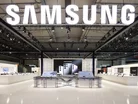Samsung: From Semiconductors to Latest AI Developments

From developing the latest and greatest mobile phones and other consumer tech offerings to advances in semiconductor manufacturing, Samsung is one of the world’s leading technology companies.
Shortly after its founding in 1969, Samsung Electronics quickly became one of South Korea’s leading manufacturers, with its early growth attributed to the rapid growth of the domestic consumer electronics industry. During this time, Samsung also acquired Korea Semiconductor, the first wafer processing company to be established in Korea, paving the way for Samsung to become a leader in semiconductor manufacturing.
In the 1980s, Samsung established a new corporate identity focused on securing its own technology, strengthening its R&D, expanding its semiconductor business and operating a telecommunications business through Korea Telecommunication Company. In 1988, Samsung Electronics established itself on the world stage following its merger with Samsung Semiconductor & Telecommunications and became a household name around the world as an official partner of the Olympic Games. It also established itself as a global leader in semiconductors based on the strength of its dynamic random access memory (DRAM) technology.
By 2007, with US$100bn in sales, Samsung had established itself as one of the world’s top three consumer electronics firms. In 2010, it became the world’s largest electronics company in terms of sales, placing it at the centre of the global electronics industry.
Today, the company follows a simple business philosophy: to devote its talent and technology to creating superior products and services that contribute to a better global society.
Samsung’s ‘AI for All’ vision
In January 2024 at CES, the company unveiled its ‘AI for All’ vision, teaming up with key partners to outline the technology behind this vision and how new products and services use AI capabilities to make life easier.
“With the emergence of artificial intelligence, smarter, better experiences will redefine how we live,” said Jong-Hee Han, Vice Chairman, CEO and Head of Samsung’s Device eXperience (DX) Division. “Samsung’s broad portfolio of powerful devices, along with the pursuit of open collaboration, will help bring AI and hyper-connectivity to all.”
This AI for All vision extends across many of Samsung’s products, from its latest visual displays to home appliances such as its smart refrigerators and even its Bespoke AI Laundry Combo: an All-in-One washer and dryer.
At CES 2024, Samsung also announced developments in the automotive industry, starting with a partnership with Hyundai Motor Group.
Through Samsung’s SmartThings brand, users will be able to utilise voice commands to remotely perform functions in their car, such as heating it up in advance or opening and closing windows, while users will also be able to control home functions from their vehicle – all via voice commands.
Key advancements in AI and computer engineering
In November 2023 Samsung shared the latest research achievements in AI and computer engineering, contributing to enhancing the company’s next-generation of semiconductor technology.
With the theme of ‘large-scale AI for a better tomorrow’, the event served as a platform to share research achievements that will result in enhancements to Samsung’s advanced semiconductor technology.
“The spotlight has recently shifted toward Generative AI technology, as it provides us the potential to unlock new solutions and address long-standing challenges,” commented Kye Hyun Kyung, President and CEO of Samsung Electronics’ Device Solutions (DS) Division. “But the need for in-depth research on the safety, trustworthiness and sustainability of AI is increasing at the same time.”
With the Samsung Advanced Institute of Technology (SAIT) serving as the company’s R&D hub and incubator for cutting-edge technologies, SAIT researchers shared their visions on how the future of semiconductor development and manufacturing will change by integrating AI into all areas of semiconductors, and explored the possibilities of future computing in semiconductor processing, including large simulation accelerated by machine learning.
AI at the heart of latest Samsung devices
Samsung’s S24 range of smartphones was the first to benefit from the company’s partnership with Google Cloud, with tech companies increasingly using AI to create innovative mobile devices.
Starting with the Galaxy S24 series announced at its Galaxy Unpacked event, Samsung was the first Google Cloud partner to deploy Google’s Gemini Pro and Imagen 2 Gen AI models.
“Google and Samsung have long shared deeply-held values around the importance of making technology more helpful and accessible for everyone,” comments Janghyun Yoon, Corporate EVP and Head of Software Office of Mobile eXperience Business at Samsung Electronics. “We’re thrilled that the Galaxy S24 series is the first smartphone equipped with Gemini Pro and Imagen 2 on Vertex AI.
“After months of rigorous testing and competitive evaluation, the Google Cloud and Samsung teams worked together to deliver the best Gemini-powered AI experience on Galaxy.”
******
Make sure you check out the latest edition of Technology Magazine and also sign up to our global conference series - Tech & AI LIVE 2024
******
Technology Magazine is a BizClik brand

